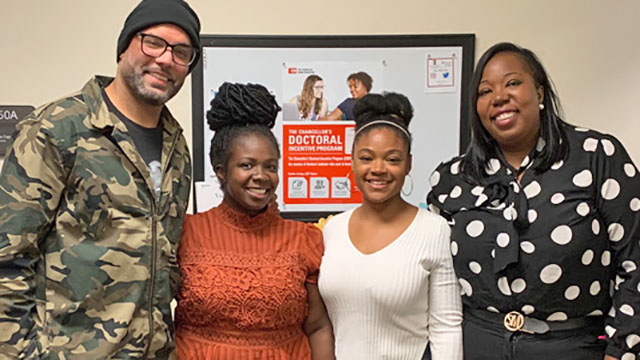Days after a San Diego State University English professor helped draw attention to a student-organized forum set to include at least one anti-Semitic speaker, the school says the student is backing off.
“The student has since opted to revise the program, and those speakers will not be confirmed to speak at SDSU,” said a tweet Monday from SDSU. “The university supports the student’s decision.”
According to Peter C. Herman, the critic, a proposal by graduate student Terry Sivers for a “summit” on reparations for slavery included Ava Muhammad, whom he called a spokesperson for Louis Farrakhan and the Nation of Islam.
“Like Farrakhan, she is viciously anti-Semitic,” Herman wrote.
“At a 2017 event, a participant asked Muhammad whether Farrakhan’s attacks on the Jews advance the cause, and she responded with a five minute diatribe of anti-Jewish charges that climaxed with her calling Jews ‘godless’ and ‘blood-sucking parasites [who] sell us alcohol, drugs, depraved sex, and every other type of low-life thing,” he added.
SDSU’s tweet didn’t specify who would be disinvited, but the original list also included author and journalist Ta-Nehisi Coates, economist Sandy Darity of Duke University, political expert Yvette Carnell, professor Frank Wilderson and Omali Yeshitela of the Uhuru Movement.
— San Diego State University (@SDSU) December 23, 2019
Herman had no problem with $68,000 in Student Success Fee money going to bring in speakers such as Coates “given that he wrote ‘The Case for Reparations.’”
But Sivers — who wasn’t immediately reachable — had a proposed speaker list included “those who have espoused anti-Semitic rhetoric in the past,” SDSU said, not specifying which were objectionable.
“We strongly reject anti-Semitic, and other disparaging messages and actions,” SDSU said. “SDSU will offer support to the student organizer to ensure that the original basis for the event — a critical exploration of slavery and reparations — can proceed.”
SDSU said it appreciated input from our on- and off-campus community members, including faculty, staff and Jewish leaders.
“This input and collaboration have helped the university to directly address the concerns raised,” SDSU said. “SDSU is also in active conversations to help ensure members of its Jewish community are supported, has revised the review and approval process for student events and is looking to expand diversity training.”
The SDSU Hillel Center of Jewish students has been a “proactive and supportive partner and we value their continued close collaboration,” the school said.
“Any effort that serves to further societal division is antithetical to what SDSU values. We are a diverse community, and it is our diversity and the preservation of an inclusive environment that creates our greatness,” the tweet added.
San Diego State didn’t respond to requests for comment.
Herman, who informed SDSU officials about his concerns before his Times of San Diego op-ed was posted, told The San Diego Union-Tribune: “ “This shows that the committees, faculty and administrators who approved this proposal either did so without vetting the summit’s speakers or they did the vetting and approved them anyway,” he said. “At the very least, they were irresponsible.”
The reparations summit was one of several


























